Well, first of all, if you’re just reading this article to get acquainted with a tool that can give your health benefits, I suggest you go to Dr. Galen’s website and enjoy it. But if you want to enter the new world of medicine with aigeeks, share it with us until the end of the article.10 Benefits Of Artificial Intelligence In Healthcare 2024 article , waiting for us.
Healthcare as a vital facet of society has a relation with lives of millions of people. It is an area not easy to fulfill because it deals with health and lives of people. Nevertheless, healthcare keeps facing numerous issues, which are associated with higher costs, increasing demand, shortage of competent workers, low quality, and safety.
In order to counter the mentioned problems, health systems should implement different innovations that will bring about the improvement of care quality, cost-effectiveness as well as accessibility of healthcare services. AI is certainly the most well-known forthcoming technology that can demonstrate transformative effects on health care.
AI is the ability of a computer system to perform thinking actions when the outcome is assumed to be because of our intelligence in people. Artificial Intelligence can accept large amounts of data, get information from repeated and form patterns, and give conclusions and suggestions present indicating action needed by the decision-making and problem-solving process.
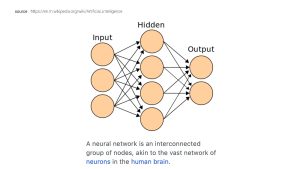
neural network
AI can also communicate with a human being via language, speech and vision through non-verbal understanding, and it executes the tasks of physical manipulation and integration. AI engages in many applications and has so much advantage for healthcare and being the purpose of this article,10 Benefits of Artificial Intelligence in Healthcare 2024 will be discussed.
But to make it easier to understand، we need to break it down into parts.
- AI in Healthcare: An Efficient and Effective Solution
- Personalized Treatment and Care
- Improved Research and Further Drug Development
- Optimized Operations and Workflow
- Empowering Healthcare Workers and Medical Citizens
- Future Prospects and Challenges of AI in Healthcare
- Conclusion
Table of Contents
AI in Healthcare: An Efficient and Effective Solution
One of the significant advantages of artificial intelligence in healthcare services is its capability to assist in the early screening and diagnosis of certain diseases.
Human eyes can miss some small abnormalities as well as signs of diseases if they devote to large-scale images so AI algorithms can process medical images such as X-rays, CT scans, and MRI scans swift and precise, detecting small abnormalities human eyes may miss. For another example, AI may give a risk score in skin cancer case by analyzing images of skin lesions and reaching such conclusion.
With the help of AI technology, cancerous area can be identified in breast tissue by analyzing mammograms and noting the areas suspicious that require additional diagnostics.
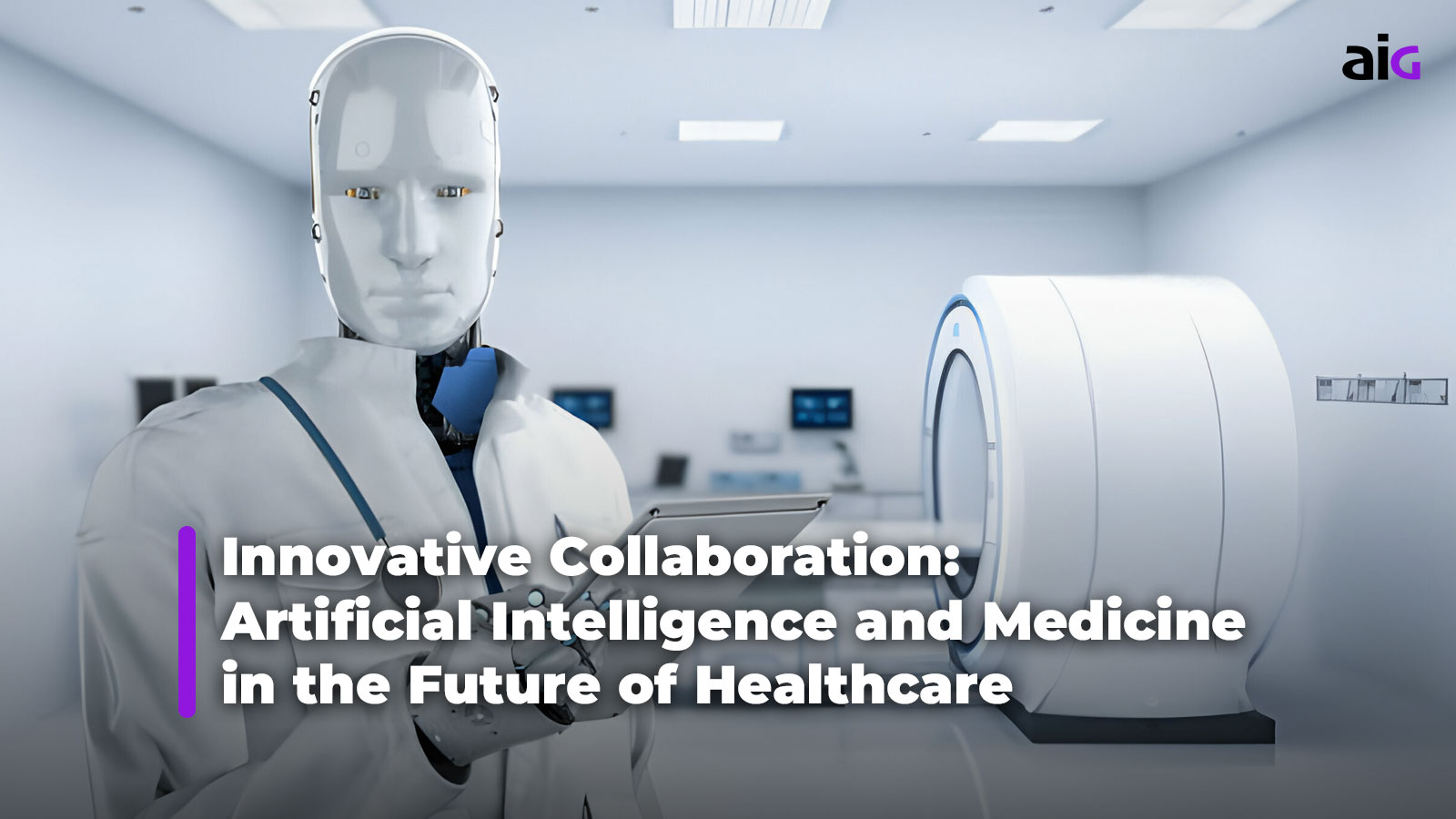
Innovative Collaboration: Artificial Intelligence and Medicine in the Future of Healthcare
Artificial Intelligence (AI) may also be beneficial for the early detection of diseases. Such AI systems analyze several information from various sources, such as medical data from electronic health records, wearable devices, genetic tests and features of environment, and finding regularities that indicate the possibility of developing a certain sickness.
AI, for instance, can identify various diagnostic tests, including cognitive tests, brain scans, and blood biomarkers, and may be used to predict the onset of Alzheimer’s and provide the individual with a personalized risk score. AI ensures the diseases control and prevention by monitoring and defining the outbreaks course and putting fast-track alarms and interventions in place.
Achieved thanks to increase in diagnosis and early detection, AI will probably lead to saving of lives, reduction of complications, and to spending less money on healthcare.
and I thinks this video can help you a lot.
Personalized Treatment and Care
In addition to AI in healthcare health, another benefit that it has is that it enables doctors to tailor treatment and care for every patient. The AI can assess the past medical history of an individual, his/her genes, lifestyle habits, personal preferences, and existing conditions, and propose a customized treatment scheme that suits the needs of the patient. AI can, for instance, supervise the patient’s progress and reaction to the therapy, making amends in the plan as needed.
For example, AI can be applied to personalize the treatment of cancer by studying the genomic profile of the tumor and the individual and thus recommending the medication that will be the most effective and have the least harmful impacts. AI in addition can enable personalized treatment of diabetes by studying of the blood sugar levels and other patient’s variables and afterwards suggestion of the optimal amount and timing of insulin.
AI can also give individual support for patients as if they were interacting with chatbots, voice assistants, and robots by dealing with them directly about various subjects and offering information, guidance, support, and companionship. Such as the AI features that allow patients to better incorporate their chronic treatments named reminders, tips and feedback on their daily self-care activities like medication adherence, diet, exercise and stress management.
Artificial intelligence can serve as another resource, not only to improve older patients’ independence and quality of life, but also to help them monitor their own conditions and provide social interaction.
Through a system that gives patients personalized care and therapy, AI will help in providing better results, satisfaction, and power to individuals.
Improved Research and Further Drug Development
The AI, as serving as a third virtue, has the potential to advance the research and drug development process which tend to be lengthy, pricey as well as difficult. Artificial Intelligence can lead to an abridgement of time to reap new drugs and therapies by sifting through the massive data sets from many sources including scientific literature, clinical trials and molecular databases, and coming up with novel targets, chemicals, and actions/mechanisms.
As an instance, AI methods contribute to finding new antibiotics by providing them with screening among a million molecules and predicting the level of bacteria fighting capability and toxicity. Moreover, AI can develop better vaccines by designing and selecting the most effective antigens and adjuvants that will most likely give a strong response as well as one that will be specific to the disease.
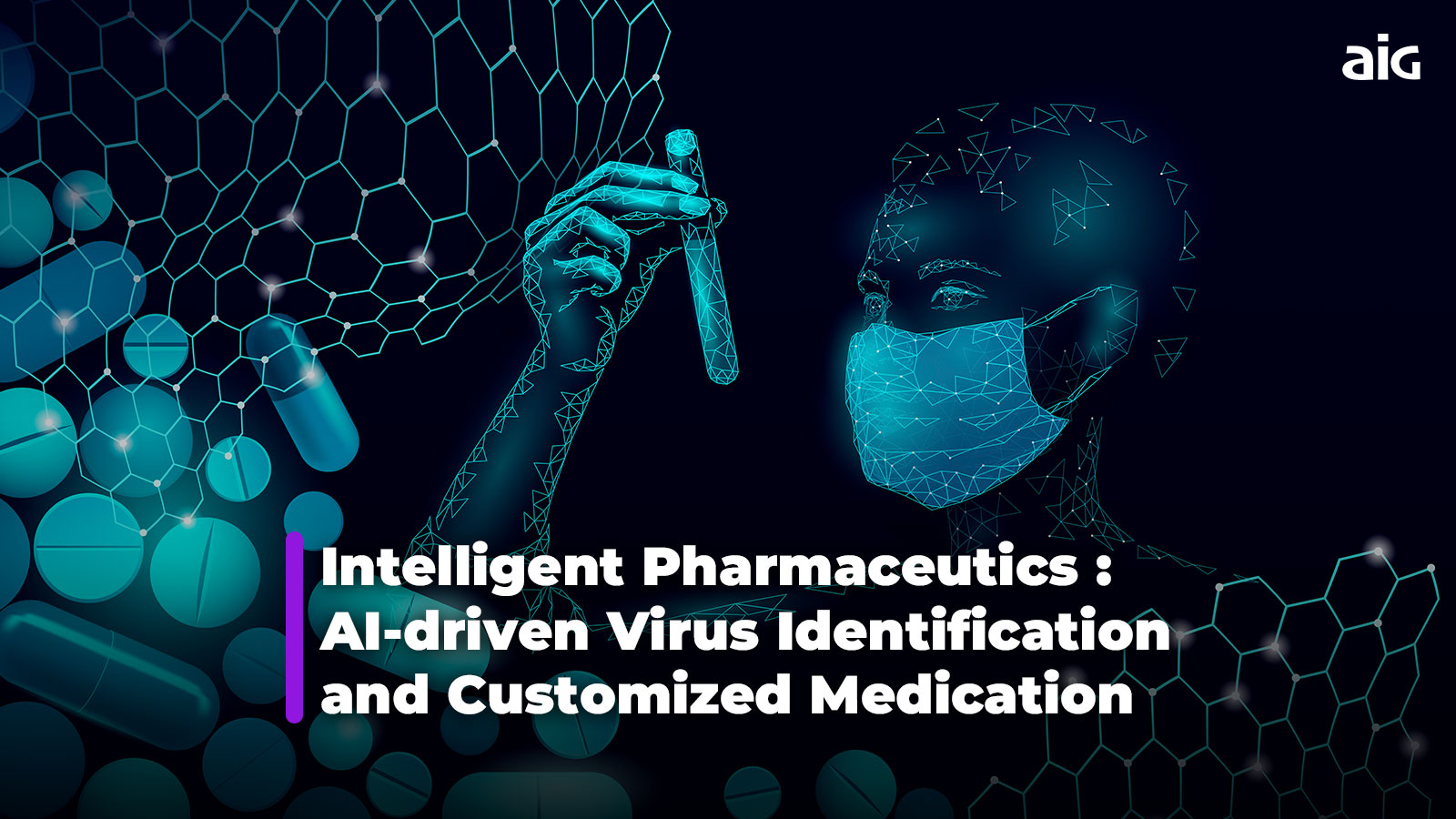
Intelligent Pharmaceutics: AI-driven Virus Identification and Customized Medication
AI can also be utilized for creating more efficient and higher quality clinical trials, which are the basic steps involved in testing the efficacy and risk-free nature of new drugs and therapies. AI is excellent in constructing and optimizing the decision-making criteria, trial protocols, and primary and/or secondary outcomes of clinical trials, and in the categorization of enrollees based on their traits and risk profiles.
Artificial intelligence has all the ability to interact with the data and results in the trials and also detect and notify if there be any biases, errors, or adverse event. Example is, AI can speed up clinical trials for COVID-19 treatments and vaccines holding the ability of selecting and recruiting the right candidates, and also giving instant instructions and insights. I believe 10 Benefits of Artificial Intelligence in Healthcare 2024 article it’s important for all doctors.
Through improving research and drug development process, AI can facilitate in bringing of innovative and personalized treatments as well as cures to the market faster, cheaper and with more efficiency.
and again, we have very powerful video for you
Optimized Operations and Workflow
Besides AI being capable to improve operations and workflow in hospitals, clinics, and pharmacies, the fourth benefit of AI in healthcare is that AI is able to be used to improve operations and workflow in healthcare organizations such as hospitals, clinics, and pharmacies. AI allows automating or streamlining a lot of routine administrative and clinical tasks, workers, like the scheduling, billing, coding, documentation and reporting.
As an example, AI can determine the time/location of appointments and surgeries for patients by considering their own preferences, complexities involved, priority requirements, and facilities in the best way possible and reducing the waiting time of patients. AI helps render and analyze medical records and claims including gathering and reviewing vital data from voice, text and image and check that the accuracy and compatibility are well maintained.
AI not only make healthcare delivery more efficient, but also it could assist concerns that ranges from diagnosis, treatment, therapy and follow-up and enhance coordination between healthcare professions and patients. In a more specific manner, AI can assist healthcare professionals by analyzing event and data and providing suggestions and alerts based on the evidence and norms.
This is another aspect of AI, which can assist and even replace various physical face-to-face interactions, such as providing virtual consultations, monitoring and interventions.
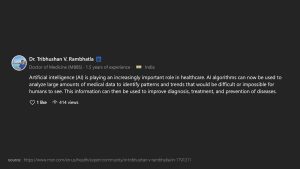
Empowering Healthcare Workers and Medical Citizens
The last benefit of AI in health care is its possibility to allow physicians and patients to acquire skills, to become health professionals, and to improve their performance and level of satisfaction. The AI can acquire up to date knowledge and help educate and train healthcare professionals who can now access the latest information, evidence and best practices, and who could receive personalized feedback and assessment.
To help medical students and residents learn and practice the correct clinical procedures through different forms of learning that are interactive, technological aids such as simulations, games, and virtual reality can be used.
AI would not only be a tool to refurbish the competence and proficiency of health care professionals by supplying them with continuous and customized education opportunities such as online courses, webinars and podcasts but it would also provide them with fresher knowledge and latest updates.
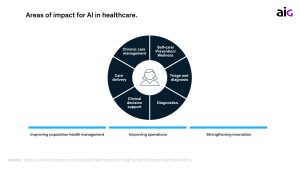
Areas of impact for Al in healthcare.
Hence, AI has the potential to alert people and engage them by offer the opportunities to have access to accurate and relevant health information and give new individualized advice and assistance. Such as role, AI can be used to raise awareness and prevention of diseases though it can do so by putting forward health education and promotion like video shows, quizzes, and newsletters services.
People can enjoy AI enhancements for better medication compliance and self-control with the help of behavior change interventions like motivational cues, nudges and rewards.
AI can provide empowerment, increase their self-esteem and motivation and in turn, boost their confidence.
this hospital has ai, make sure to watch this video.
Future Prospects and Challenges of AI in Healthcare
AI, like other technologies, can be beneficial to healthcare in some facets, but it could also raise challenges and risks that need to be done very well. Some of the main challenges and risks are: Some of the main challenges and risks are:
- Data quality and availability: One of the major challenges with AI is data. Therefore, AI depends on large and varied data sets for training and validation but in the process, the data could be inaccurate, inconsistent, biased, or incomplete, and thus, affecting AI’s performance, and reliability. On top of that, it is possible that the data will be splintered, inaccessible, or not cooperating, which can be an obstacle for AI integration and interoperability.
- Ethical and legal implications: AI refers to the application of the technology that is sensitive and personal, namely health records, genetic tests, and biometric data, which sometimes lead to the moral and legal problems such as privacy, consent, ownership, and protection. On the other hand, AI may be used to generate tremendous implications on healthcare including diagnosis, treatment, and prognosis. It causes to the ethical and legal issues such as accountability, responsibility, and liability.
- Human and social aspects: AI may make people rethink about the distribution of roles and responsibilities in health care system, for example, who has more authority and how much independence to the person and what kind of trust and empathy do they become. AI, on the other hand, can lead to no less significant societal and cultural changes including concerns over the distribution and social risks of AI, accessibility and fairness, as well as the implications for social and cultural norms.
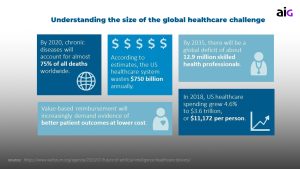
the size of the global healthcare challenge
you can see future of healthcare in this video.
Conclusion
AI which is potent and thus transformative technology that may undergo such a revolution in healthcare. Many of AI applications can serve healthcare by helping to improve diagnostic procedures and early diagnosis, developing a tailored treatment and care plan, providing an opportunity for better research and drugs production, managing operations and workflow in a more optimized way, and support for physicians and patients which are upgraded. We finally got to the end of 10 Benefits Of Artificial Intelligence In Healthcare 2024.

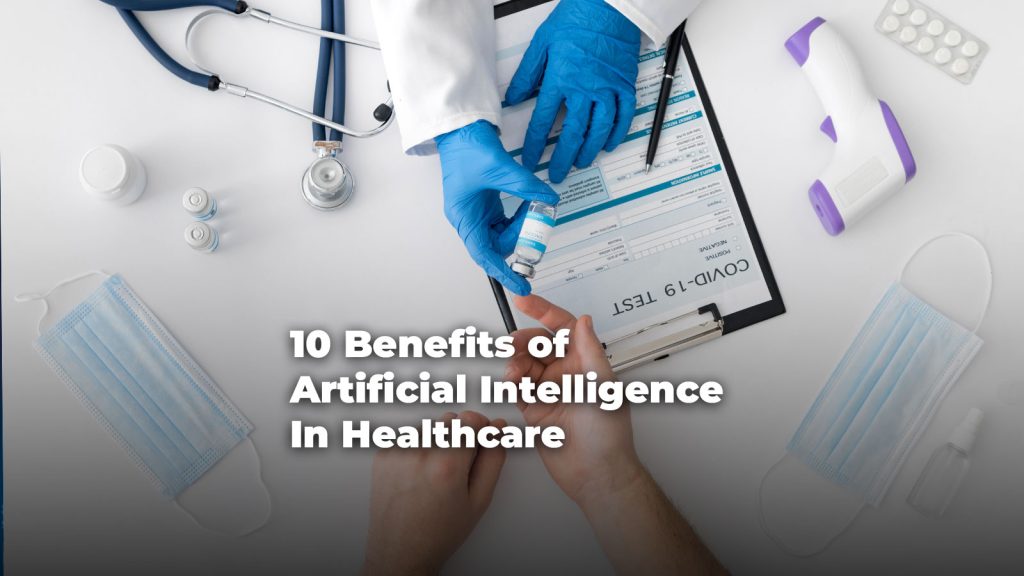

![Top 10 Ai Art Generator [ No Restrictions and Free to Use ]](https://aigeeks.net/wp-content/uploads/2024/02/Top-10-ai-art-generator-no-restrictions-and-free-to-use-300x169.jpg)
